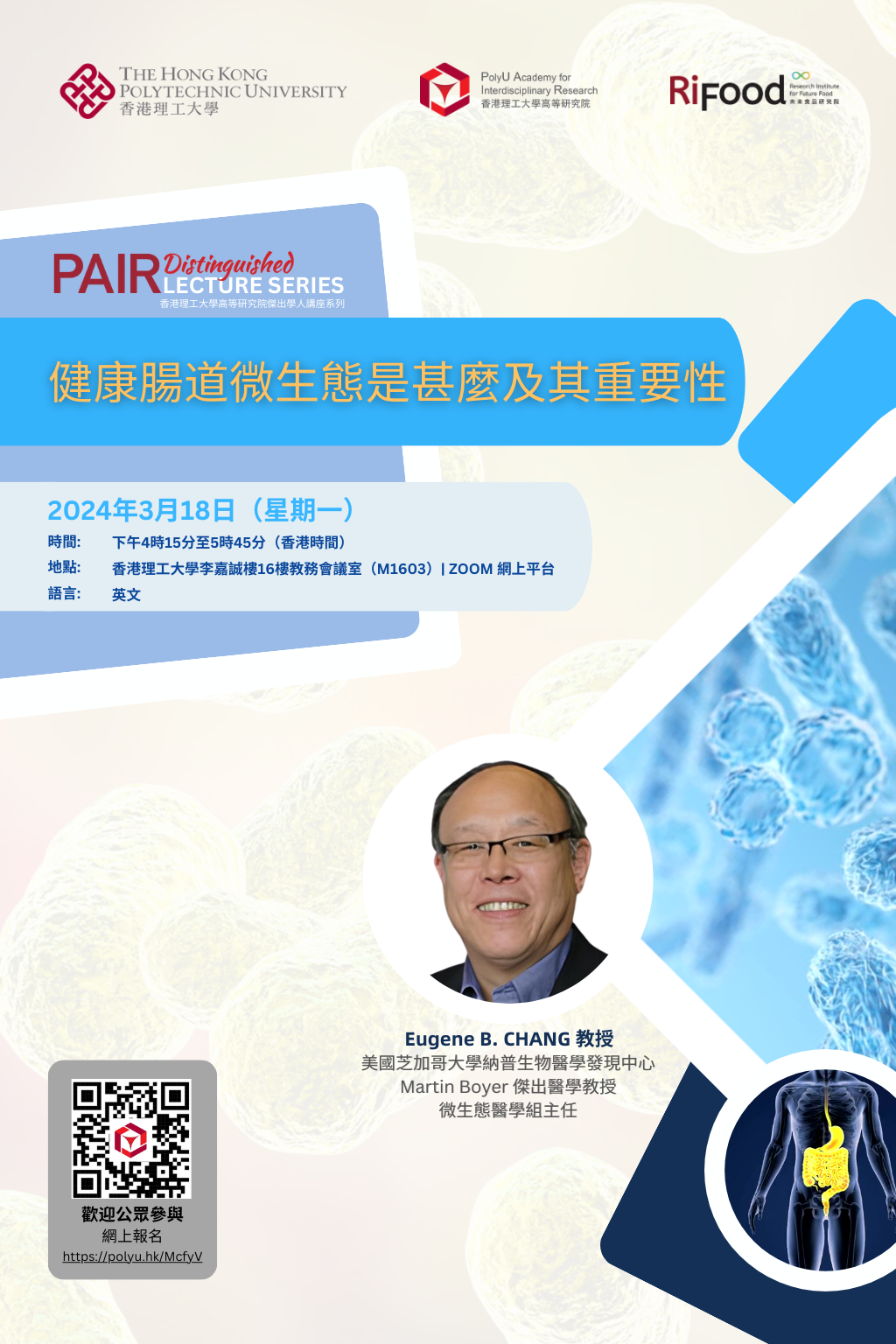理大高等研究院傑出講座系列: 健康腸道微生態是甚麼及其重要性
會議/講座

-
日期
2024年3月18日
-
主辦單位
PolyU Academy for Interdisciplinary Research
-
時間
16:15 - 17:45
-
地點
理大李嘉誠樓16樓教務會議室 (M1603室) 地圖
講者
Eugene B. CHANG 教授
備註
公眾開放
摘要
在胃腸道裡的不同生態系統中,有著數萬億種的微生物,這些微生物是構成宿主健康所需的重要器官。與身體的其他重要器官一樣,腸道微生物器官通過促進營養消化和吸收、宿主免疫力發展和調節,以及維持代謝穩態等過程,為體內區域和系統上帶來益處。另一方面,腸道微生態的受損和功能失調(即「微生態失調」),可增加艱難梭菌結腸炎、炎症性腸病、神經系統疾病、糖尿病和肥胖症等多個疾病的風險和發病率。由於至今我們對於如何定義和量化腸道生態健康(「微生態健康」)尚未達成共識,故此腸道微生態健康的修復或恢復仍是個挑戰。如不了解何謂「微生態健康」,那麼定義「微生態失調」會變得更困難。目前基於微生態的干預措施(例如,活體生物治療藥物、醫療食品和糞便微生物移植)的開發和實踐很大程度上是實驗性的,療效往往仍有待商榷。故此,我們需要評估腸道微生態功能的定量指標。本次講座將重點討論這些工具的原理和開發。
講者

Eugene B. CHANG 教授是芝加哥大學 Martin Boyer 傑出醫學教授。Chang教授透過腸道微生態視角,研究在腸道健康和疾病狀態下(特別是炎症性腸病(IBD)和代謝紊亂)的宿主微生物相互作用和疾病的致病機理。為探究箇中機理,他的研究室採用實驗、臨床和生物資訊學(機器學習和人工智慧)方法來辨明與維持腸上皮、免疫系統和代謝穩態相關的特定作用機制和生物標記。他曾參與美國國家衛生研究院(NIH)「人類微生態計劃」,目前有多項交叉學科研究獲該院資助。Chang教授擔任美國國家衛生研究院的國家糖尿病、消化和腎臟疾病研究所(NIDDK)P30 消化疾病研究中心(DDRCC)主任逾20多年,他同時為NIH 國家消化疾病委員會成員、NIDDK 理事會成員、NIH 優異獎得主、IBD 研究實驗室主任、胃腸病學研究小組前主席、美國胃腸病學協會(AGA)理事會主席,曾任多屆AGA管理委員、NIDDK 諮詢委員,同時為芝加哥大學微生態組醫學計劃主任。他擁有超過40多年指導科研發展的豐富經驗,獲頒多個指導和教學獎項,曾擔任NIH 消化健康與疾病撥款計劃(T32)培訓主任及計劃總監,及設計相關培訓課程。其課程獲AGA認可,及納入芝加哥大學傑出醫學教育家學院碩士課程。他的研究發表於《Nature》、《Cell》及《Science》等國際知名期刊。
你可能也感興趣



